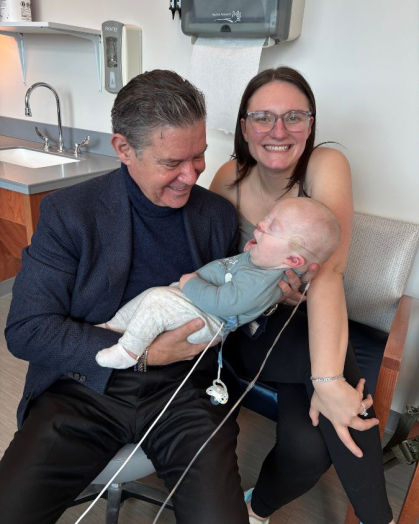P. Ashley Wackym, a surgical otologist-neurotologist at Rutgers Robert Wood Johnson Medical School, uses a technique he developed to fix a rare, debilitating inner ear condition
For five years Tina Henry, who played softball for years and worked at a job where she stood all day, went to multiple doctors trying to find out why she was so dizzy and often couldn't get off the couch.
She underwent computerized tomography scans and had magnetic resonance imaging performed, but no problems were detected. Her blood pressure was fine. No brain tumor was visible. But Henry, beginning at age 21, couldn't stand without losing her balance and could hear her eyes when they blinked and loud chewing when she ate.

Her quality of life, she said, couldn't have gotten worse.
"I was ready to give up," said Henry, who at 26 was planning to get married. "I wanted to become a mother more than anything else but part of me thought my future husband should just walk away and find someone else."
That was until she met P. Ashley Wackym, a surgical otologist-neurotologist at Rutgers Robert Wood Johnson Medical School who diagnosed her with cochlea-facial nerve dehiscence, a type of third window syndrome in which, in addition to the two normal holes present in healthy ears, there is an extra hole. The condition disrupts the normal flow of pressure, causing imbalance and symptoms like dizziness, chronic headaches and a sensation of hearing internal body sounds and movements.
"I was so happy that someone was finally telling me what was wrong," said Henry, who gave birth to a son, Dawson Phillip Henry, on Nov. 1, two years after her surgeries. "I remember telling Dr. Wackym that I really wanted to be a mom and to please do this so I could have someone to name my child after."
Wackym, chair of the Department of Head and Neck Surgery & Communication Sciences at the medical school, said he could help Henry by using a surgical technique he developed to relieve pressure in both inner ears by stiffening and reinforcing one of the natural holes in each ear to reduce the abnormal shifts that are caused by the third hole
In cases like Henry's, where the hole is in between the cochlea and the facial nerve, just plugging the hole - which is done in other third window syndrome conditions - could result in facial paralysis or deafness. Stiffening the natural hole, however, corrects the problem and prevents damage to other structures, Wackym said.
I was so happy that someone was finally telling me what was wrong. I remember telling Dr. Wackym that I really wanted to be a mom and to please do this so I could have someone to name my child after.
Tina Henry
The surgeries worked. While Henry has some ringing in her ears, the constant dizziness is gone, and she can take care of her son who was born with a rare development disorder that affects many parts of the body.
When Wackym, whose first name is Phillip, found out Henry named her child after him, he was surprised because he was laser-focused on correcting her problem and hadn't remembered what she said about naming her child after him.
"At first I thought, I don't deserve that," he said. "But it was humbling and really sweet that she did."
Wackym will try and restore hearing to Henry's six-month-old son, who was born with Pallister-Killian mosaic syndrome and is severely hearing impaired. The infant will need to have cochlear implants, electronic devices that can help those with severe hearing loss to hear sounds by directly stimulating the auditory nerve. Wackym has performed the procedure more than 1,000 times and said the cochlear implants should allow his namesake to hear.
Henry has faith that Wackym will be able to help her son the way he helped her. She will never forget the day she met Wackym when his medical colleague told her she needed to see the "exotic ear doctor."
Even though it only took Wackym one visit to make an initial diagnosis, he doesn't fault others who couldn't diagnose the problem. The condition wasn't medically identified until 2014 and the disorders remain unknown to many in the medical community. Individuals can be born with the condition, which can be exacerbated by increased pressure from a variety of situations such as a car accident or a concussion to childbirth or heavy coughing.
The extra hole that opens in the inner ear can be in one of 16 different areas, which makes the condition more difficult to diagnose, he said.
We expect doctors to know everything, but they don't. The best way to get out the information is if patients write the doctors that they saw a note thanking them for taking care them and letting the doctors know what the problem was and how it was fixed.
P. Ashley Wackym
Chair, Department of Head and Neck Surgery and Communication Science, Rutgers Robert Wood Johnson Medical School
"Most patients do get pretty frustrated, and I can understand why they do," said Wackym. "They often say they've seen four to 10 doctors, and no one has an answer."
He tells his patients, who come from throughout the United States and overseas, to reach back to all the doctors they saw before receiving the third window syndrome diagnosis and getting the problem fixed. This will provide doctors with information that will help them treat others.
"We expect doctors to know everything, but they don't," Wackym said. "The best way to get out the information is if patients write the doctors that they saw a note thanking them for taking care them and letting the doctors know what the problem was and how it was fixed."






